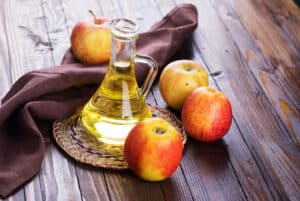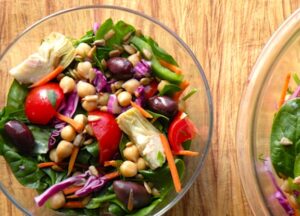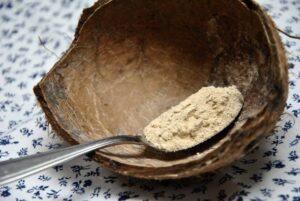Excerpted from Becoming Vegan: Comprehensive Edition by Brenda Davis, RD and Vesanto Melina, MS, RD © 2014 The Book Publishing Co. Reprinted by permission. The foods and fluids athletes consume before, during, and after events or training sessions can make or break their performance. Compared to the general population, athletes require more energy to fuel physical activity and more fluids to compensate for perspiration losses.
Depending on an athlete’s individual needs, meals, snacks, and beverages are best selected and times based on the intensity and duration of the workout or event. Hydration is extremely important; a loss of more than 2 percent of body mass through perspiration and dehydration can adversely affect performance, especially in warm climates and high altitudes. Dehydration is also associated with heat exhaustion and heat stroke.
Pre-Event Food and Fluid
Ideally, a pre-event meal will provide sufficient fuel to sustain an athlete throughout the event. Timing is everything: the trick is to eat just enough to maximize performance but avoid having undigested food in the stomach. To help hasten digestion, the chosen meal or snack should be relatively low in fat and fiber; to boost fuel availability, it should be high in carbohydrate. The closer the meal is to an event, the smaller the meal ought to be. Liquid meals may be more convenient and digestible within an hour of an event.
Consuming 200 to 300 grams of carbohydrate three to four hours before an event has been shown to enhance performance In general, four hours before an event, the rate of carbohydrate consumption should be about 4.5 grams per kilogram of body weight; one hour before an event, it should be about 1 g/kg of body weight.
Pre-exercise or pre-event foods are best chosen based on individual tolerance. Athletes who experience nausea, cramps, or vomiting may need to avoid solid foods within three to four hours of an event. Those prone to reflux are advised to steer clear of foods that exacerbate their symptoms prior to competition (e.g., caffeine, chocolate, fatty or fried foods, or carbonated beverages). Individuals who frequently experience diarrhea may wish to reduce fiber intake twenty-four to thirty-six hours before an event.
Generally, an athlete’s muscle glycogen stores are sufficient for events that last sixty to ninety minutes. During events longer than ninety minutes (marathons, triathlons, long-distance swims, and similar demanding activities), athletes can experience extreme fatigue (often referred to as “hitting the wall”) when glycogen stores become completely depleted. Not surprisingly, athletes often attempt to boost glycogen stores before longer competitions.
For many years, athletes used a strategy known as carbohydrate (or carb-) loading, which involved a period of relatively low carbohydrate intakes and intense exercise to deplete muscle glycogen. This was followed by a period of tapered exercise and high carbohydrate intakes to supercompensate for the reduced stores. More-recent studies suggest that athletes don’t need the depletion phase to boost glycogen stores. Simply tapering exercise and eating a high-carbohydrate diet (about 10 g/kg/day) for thirty-six to forty-eight hours before a competition is sufficient. Of course, carbohydrates consumed just before and during the event provide additional fuel.
Athletes need to drink water or a sports beverage in the amount of 5 to 7 milliliters per kilogram of body weight at least four hours before competition or training (although excess fluid intake is discouraged before an event, because this increases the need to void during competition).For example, a 160-pound (73 kg) athlete should drink 11⁄2 to 2 cups (375 to 500 ml) of liquid. Athletes who compete in intense, long-duration events (more than an hour) with minimal opportunity to hydrate may require fluids fifteen minutes before the start of the event.
Event Food and Fluid
Although sports drinks and other sources of calories are generally unnecessary for activities lasting less than an hour, they may provide benefits during intense endurance events. The additional carbohydrates can help to maintain blood glucose levels and can be particularly useful if the event or activity takes place in the early morning on an empty stomach. Beverages that supply no more than 6 to 8 percent of carbohydrate are recommended; fluids that provide more than 8 percent of carbohydrate content (such as soda) can reduce gastric emptying.
To extend endurance during events or activities that last more than an hour, carbohydrates in the approximate amount of 0.7 grams per kilogram of body weight per hour are advised. For most people, this means consuming 30 to 60 grams of carbohydrate per hour during the event. Some experts recommend intakes as high as 90 grams per hour for events or activities that last three hours or longer. In that case, it’s more effective to consume the carbohydrates every fifteen to twenty minutes, rather than having larger amounts at one time.
Including carbohydrates during exercise is especially important for athletes who haven’t carb-loaded before the event, who haven’t eaten three to four hours before the event, or who have limited caloric intake for weight loss. The carbohydrates consumed should yield primarily glucose (as opposed to primarily fructose, because fructose is a less-effective fuel and may cause diarrhea in some athletes). Whole foods and products made from whole foods, including fruits, are acceptable; beverages sweetened with fructose aren’t recommended.
Because the body can use only about 60 grams of any single carbohydrate source per hour (e.g., glucose), foods and beverages that provide a mixture of different types of carbohydrates may be preferable. The carbohydrate can be consumed as a beverage, snack, or gel. However, if a snack or gel is selected, adequate water must also be provided.
Athletes also need to maintain adequate hydration, which means getting sufficient fluids and electrolytes (especially sodium). Perspiration rates can vary from 0.3 to 2.3 liters per hour, depending on climate, body weight, genetics, and metabolic efficiency, making it impossible to formulate one fluid- and electrolyte- replacement schedule for all athletes. However, serious athletes can establish sweat rates for specific activities and conditions.
Sometimes athletes become dehydrated because their sweat rate exceeds their ability to absorb fluids from the stomach. Many experts suggest drinking sufficient fluids during an event to limit dehydration to less than 2 percent of body weight, although some athletes can withstand greater losses. It may be helpful to replenish sodium during endurance events that last more than an hour, because an average of 1 gram of sodium is lost per liter of perspiration. Athletes also lose modest amounts of potassium, magnesium, chloride, and other minerals in sweat.
Common signs of dehydration include muscle cramps, muscle fatigue, low blood pressure, dizziness, and headaches. While most cases of dehydration result when fluid loss exceeds fluid intake, some athletes may begin a competition in a dehydrated state, because they have too little time between events to rehydrate or they’re limiting foods and fluids to make a weight class for the competition.
Athletes must maintain hydration without drinking to excess. Overhydration can lead to hyponatremia (low sodium levels), a serious and sometimes fatal condition. Although it can occur in any athlete who consumes too much fluid, hyponatremia is more common in slow, less well-trained athletes who sweat less and drink excess fluids before, during, and after an event.
Competitors can replenish carbohydrates, fuel, and electrolytes during endurance events by consuming water and solid foods (such as energy bars), although this approach isn’t always convenient. A more practical option for many athletes is to consume beverages that provide fluid, fuel, and electrolytes. The joint position of the ACSM, ADA, and DC suggests beverages that provide 6 to 8 percent of carbohydrates or 14 to 18 grams of carbohydrate per cup (250 ml), and 125 to 175 mg of sodium per cup (250 ml), although more sodium may be required by someone who sweats heavily.
Post-Event Food and Fluid
After an event or training session, the body must rehydrate, reestablish muscle and liver glycogen stores, and ensure maintenance of lean muscle tissue. Food and fluid needs depend on the intensity and duration of the completed event or training session and the timing of the next event. For athletes participating in more than one event in a day, the interval between events is critical; for a single event, the post-event protocol is less significant.
Ideally, athletes should begin to replenish glycogen stores within thirty minutes of an event. Eating carbohydrates at a rate of 1 to 1.5 grams per kilogram of body weight at two-hour intervals for up to six hours is generally recommended, especially if glycogen stores need to be replenished for another event. For example, a 160-pound (73 kg) athlete would eat 70 to 110 grams of carbohydrate immediately after an event, and again at 2.5 hours and 4.5 hours; for a 120-pound (55 kg) athlete, carbohydrate intake would be 55 to 80 grams each time.
Although refueling isn’t as important if there are rest days between events or training days, including a post-event meal helps athletes meet energy intake goals. Eating food with a high glycemic index (GI) results in higher glycogen stores following glycogen depletion than consuming food with a low GI. Some authorities suggest a carbohydrate to protein ratio of 3:1 to ensure sufficient protein for muscle-tissue synthesis and repair. Other experts suggest consuming 15 to 25 grams of protein after workouts or events.
After an event or training session, athletes need to replace the fluids and sodium lost in perspiration. Generally 6 cups (1.5 L) of fluid are recommended for every kilogram lost (2.2 lb). This is especially important when athletes participate in multiple events with limited time between events.
Brenda Davis and Vesanto Melina are both Registered Dieticians and sought-after speakers. For more information on their work, go to BecomingVegan.CA.
- For related information, see The High Performance Vegan Athlete: It is Possible! by Brendan Brazier.






Adrian knight says
What about antioxidants and high nutrient replacement. When is the best time to ingest these? Immediately post exercise or later (thinking about stress response being diminished by early use of antioxidants) ?